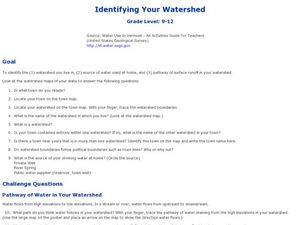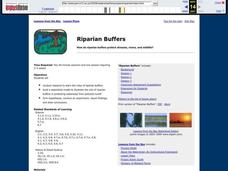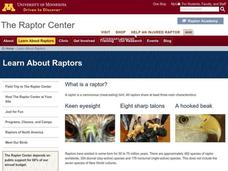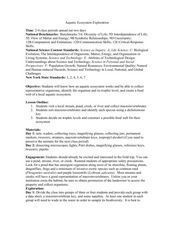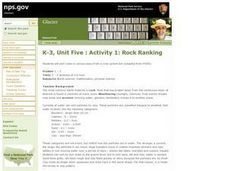Curated OER
What is a Watershed?
Learners create a classroom size model of a landscape to define the concept of a river watersheds. They spread crumbled newspapers around the floor to simulate different elevations then cover the whole landscape with a sheet. They pour...
Curated OER
Natural Features
Students identify natural features on a map. In this geography instructional activity, students identify six physical features and create pictorial definitions for each term. The terms which are listed in this instructional activity are...
Curated OER
Identifying Your Watershed
High schoolers identify the watershed where they live and how it is related to their own water consumption. In this watershed lesson students locate their watershed on their town map. The high schoolers find the source of their water...
Curated OER
The Life and Times of the West River 1776-1896: A Study of Early Industry in Westville
Students examine the role of the West River in Connecticut in providing water power to local industries. In groups, they determine and discuss what needs to be considered before building along a river. They also research the other...
Curated OER
A Coin Out of Water
Students examine the Michigan state quarter and identify land and water on the quarter. They locate the Great Lakes and other bodies of water on a map. They compare and contrast streams, rivers, ponds, lakes, and oceans.
Curated OER
Rock River Watershed
Students discover what a watershed is and which one they live in. Using the internet, they research why watersheds are important to an ecosystem and how to keep them from getting polluted. They use a map to locate various items within a...
Curated OER
Monitoring River Levels
In this environmental science worksheet, learners read and study water maps from an interactive website to complete 8 short answer questions that follow.
Curated OER
Riparian Buffers
Students research the roles of riparian buffers and create a model that shows the role of the buffers in protecting waterways from pollution. They conduct an experiment from which they record their data in this unit which is spread over...
Curated OER
TE Activity: Stream Consciousness
Fourth graders study how environmental engineers monitor water quality. They use environmental indicators to determine the quality of stream water in their area. They count the number of macroinverabrates and use the information they...
Curated OER
Piece Like a River
Learners investigate water formations by creating a puzzle. In this water properties lesson, students create a giant river puzzle by drawing on large butcher paper as a class, then dividing the image up into many pieces. ...
Curated OER
River Study
Students study physical features of a local stream. They study how to identify water features on topographic maps.
Curated OER
FOLLOW THAT WATER
High schoolers build simple stream tables and vary the angle of the stream tables in order to simulate different flow rates and compare the results. They observe various features formed in a stream table by flowing water and compare...
Curated OER
Stream Ecology In Wisconsin and Puerto Rico
Students identify the different types of water and explain in what proportions they exist on Earth. They identify and correctly label the parts of the water cycle and how these parts interact with each other. Students identify the...
Curated OER
The Wolf, the Goat, and the Head of Cabbage
In this problem solving instructional activity, high schoolers solve 1 word problem about crossing a stream. Students must carry 3 items over a stream while following certain requirements.
Curated OER
Using Abiotic and Biotic Parameters to Monitor Air Quality
Students identify the abiotic factors that influence a river or stream and the organisms that live in it. They measure several abiotic and biotic parameters to gauge water quality. Students examine the biotic environment by identifying...
Curated OER
Know Your Watershed
Students investigate the importance and the location of their own watershed by visiting and EPA website and also work in groups to create an action plan on how to protect their local watershed.
Curated OER
The Water Cycle
A short, but nicely done, presentation on the basics of the water cycle. In it, learners view slides which describe the fascinating process of how the sun creates water vapor, which creates clouds, which create rain, which flows into...
Curated OER
Shedding Light on Watersheds
High schoolers discuss what a watershed is, complete online activities showing them how to take care of a watershed, and create a model of a watershed that they experiment with to see what happens when it is disrupted by civilization.
Curated OER
Aquatic Ecosystem Exploration
Young scholars visit a local stream, pond, creek, or river and collect macroinvertebrates. They sort macroinvertebrates and identify each species using a dichotomous key. Students decide on trophic levels and construct a possible food...
Curated OER
The Flow of Fresh Water
For this water flow worksheet, students complete 15 word puzzles, a word search, and 2 picture puzzles about the flow of water and erosion.
Curated OER
Wetland Transects
Students lay out transect lines beside a local stream or river. There they record species of plants and insects living around the stream. By doing so, students explore how to use transect sampling techniques, use a variety of methods to...
Curated OER
Salmon Homing Instincts
Students study the conditions of salmon imprinting as the fish returns to spawn in its native waters. Scented cards are used to mimic the imprinting process as the student fishes search for and identify obstacles to reaching their native...
Curated OER
Chemical Consequences of Burning Fossil Fuels
Future scientists are introduced to the chemical consequences of burning fossil fuels, learning that fossil fuel combustion leads to the formation of oxides of three nonmetals: carbon, nitrogen, and sulfur, all of which end up in the...
National Park Service
Rock Ranking
Junior geologists sort rocks and soil. They separate a sample of river gravel by size, shape, color, and other characteristics. To include Common Core standards, you could have little ones graph the number of particles in each sample.
Other popular searches
- Streams and Rivers
- Create Rivers and Streams
- Rivers and Streams Fl
- Rivers and Streams Lab
- Rivers and Streams Biomes
- Streams Rivers
- Rivers and Streams Bio Mes




